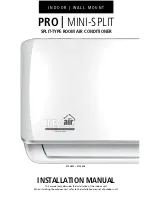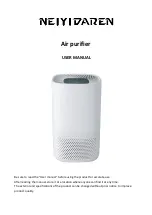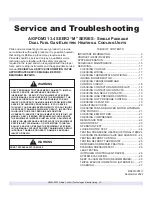
49
Electrical System Installation
Due to our policy of continuous product innovation, some specifications may change without notification.
©LG Electronics U.S.A., Inc., Englewood Cliffs, NJ. All rights reserved. “LG” is a registered trademark of LG Corp.
ELECTRICAL SYSTEM INSTALLATION
&RPPXQLFDWLRQ&RQQHFWLRQ3RZHU&DEOH6SHFLILFDWLRQVIURP2XWGRRU
Unit to Indoor Unit
• Always verify the communication cable is connected to a commu-
nications terminal on the Single Zone unit.
Never apply line
voltage power to the communication cable connection. If contact is
made, the PCBs will be damaged.
• The shield of the communications cable connecting the outdoor unit
to the indoor unit must be grounded only to the outdoor unit frame.
• Tie the shield of each cable segment together using a wire nut at the
indoor unit. Maintain polarity throughout the communication network.
• Position the incoming power to the outdoor unit away from the
power / communications cables from the outdoor unit to the indoor
unit.
•
Never use a common multiple-core communications cable.
&RQQHFWLRQVDQG6SHFL¿FDWLRQV
Figure 78: Typical Single Zone Outdoor Unit to Indoor Unit Wiring and
Communications Cable Diagram For Wiring Lengths Up to 130 Feet.
Communication / Connection
(Power), Ground Cable
From Outdoor Unit
To Indoor Unit
13/16"
GN/YL
GN/YL = (Ground, Yellow)
7/16" ± 1/8"
• For communication / connection (power) wires between the Single
Zone outdoor unit and the indoor unit for lengths up to 130 feet,
use a minimum 14 gauge, four (4) conductor, stranded, shielded
or unshielded wire. If shielded, the wire must be grounded to the
chassis at the outdoor unit only.
• When the communication / connection (power) wires between the
indoor unit and outdoor unit is GREATER THAN 130 feet, use:
• A two (2) conductor wire for power.
• A two (2) conductor wire for communication / ground.
• Separate the power AT LEAST two (2) inches away from the
communication / ground wire.
• All wiring is still minimum 14 gauge, stranded, shielded, or
unshielded as cited above.
• Insulation material as required by local code.
• Firmly attach the cable; provide slack but secure in a way to pre-
vent external forces from being imparted on the terminal block.
• Wiring must be completed without splices.
All power wiring and communication cable installation must be per-
formed by trained service providers working in accordance with local,
state, and National Electrical Code (NEC) / UL / ETL federal regulations
related to electrical equipment and wiring, and following the manufac-
turer product diagrams, requirements, and instructions in this manual.
Failure to do so will lead to electric shock which can cause physical
injury or death.
Figure 80: Typical LS180-240HEV2 Power / Communication System
Diagram For Wiring Lengths Up to 130 Feet.
Figure 79: Typical LS090-120HEV2 Power / Communication System
Diagram For Wiring Lengths Up to 130 Feet.
208/230 VAC
Figure 81: Typical LS090-120HXV2 Power / Communication System
Diagram For Wiring Lengths Up to 130 Feet.
LS090, 120HXV2
115 VAC
















































